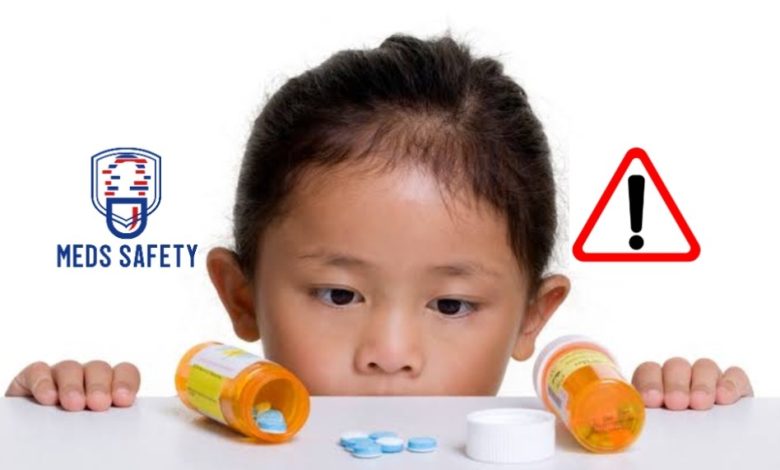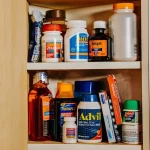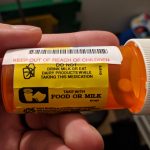10 Reasons Why Medicines Are Kept Away From The Reach Of Children

The safety of children is of utmost importance to parents and caregivers, and one area that demands particular attention is the storage of medicines. Pharmaceuticals, while essential for managing health conditions, can pose significant risks to children if accidentally ingested or misused.
Among young children, medication-related poisoning is a concerning issue that often leads to emergency department visits. According to statistics, a staggering 95 percent of these incidents occur because children accidentally ingest medications while unsupervised. This underscores the importance of constant vigilance and keeping medicines out of their reach.
Young children possess an innate curiosity and a tendency to explore their surroundings, including items they find intriguing or colorful, like medicine bottles or pills. Inquisitive little hands can quickly get a hold of unsecured medications left within their reach. Even seemingly child-resistant containers may not always be sufficient to deter a determined child, making secure storage paramount.
Additionally, approximately five percent of medication-related poisoning incidents in young children are attributed to dosing errors made by caregivers. Accidentally providing incorrect doses or administering the wrong medication can have serious consequences. These errors may occur due to distractions, busy schedules, or confusion caused by multiple medications in the household. In this article, we will explore ten compelling reasons why medicines must be securely stored away from children.
What are Medicines?
Medicines, also known as pharmaceutical drugs or medications, are substances used to diagnose, treat, prevent, or alleviate various medical conditions in humans and animals. These compounds are developed through extensive research and testing to ensure their safety and efficacy. Medicines play a crucial role in modern healthcare, allowing healthcare professionals to manage illnesses, control symptoms, and improve overall quality of life for patients.
There are different types of medicines, including prescription drugs, which require a healthcare professional’s authorization, and over-the-counter drugs, which can be purchased without a prescription. Medicines come in various forms, such as tablets, capsules, syrups, creams, injections, and patches, to suit different patient needs and conditions.

10 Reasons Why Medicines Are Kept Away From The Reach Of Children
While medicines offer numerous benefits, they may also have side effects and interactions with other drugs or substances. Keeping medicines out of their reach is crucial to prevent accidental poisoning or adverse reactions. Here are the reasons why medicines must be securely stored away from children:
1. Ingestion Accidents: Young children are naturally curious and may mistake medicines for candy or food, leading to accidental ingestion. Even small amounts of some medications can have severe consequences for a child’s health, making it imperative to keep them inaccessible.
2. Toxicity and Overdose: Medications designed for adults may have different dosages and formulations, making them toxic or even lethal to children. Accidental overdose can lead to life-threatening situations, which is why strict storage precautions are necessary.
3. Allergic Reactions: Children may be more sensitive to certain drugs, and exposure to allergens in medicines can trigger severe allergic reactions. Keeping medicines out of their reach reduces the likelihood of unintended exposure.
4. Non-Childproof Packaging: While some medicines come in child-resistant packaging, not all do. Placing medicines in areas that children cannot access adds an extra layer of protection.
5. Misinterpretation: Children may not understand the significance of medicine labels and may take inappropriate amounts or mix different drugs, leading to dangerous interactions.
6. Unsuitable Self-Medication: Older children might be tempted to self-medicate or share medicines with their peers, leading to potential misuse or accidental harm.
7. Cognitive and Motor Skills: Young children lack the cognitive and motor skills to handle medicines safely. They may spill liquids, drop pills, or put their hands in their mouths after touching medications.
8. Unsupervised Access: Children are often left alone or unsupervised for short periods, during which they may come across accessible medicines, increasing the risk of accidents.
9. Resilience and Exploration: Children’s natural resilience and curiosity can lead them to find inventive ways to access medicines, necessitating secure storage practices.
10. Parental Forgetfulness: With busy lifestyles and multiple responsibilities, parents and caregivers might occasionally forget to put medicines away, leaving them within the reach of children.
How to Keep Medicines Away From the Reach Of Children
Keeping medicines away from the reach of children is essential to ensure their safety and prevent accidental ingestion or misuse. Here are some practical steps you can take to safeguard medicines:
1. Store Medicines in a Secure Location: Keep all medications, including prescription and over-the-counter drugs, in a locked cabinet or a high shelf that is out of children’s reach. Choose a location that is not easily accessible to curious little hands.
2. Use Child-Resistant Containers: Whenever possible, opt for medications that come in child-resistant packaging. Remember that child-resistant does not mean child-proof, so it’s still crucial to store them out of reach.
3. Separate Medicines from Food and Drinks: Do not store medications in places where you keep food or beverages. This helps prevent confusion and accidental ingestion.
4. Educate Children about Medicine Safety: Teach your children about the importance of not touching or consuming medicines without adult supervision. Explain that medications are only meant for use by adults or as prescribed by a doctor.
5. Lead by Example: Be a role model when it comes to medicine safety. Always take medications in front of your children and demonstrate responsible behavior.
6. Properly Dispose of Medicines: When medications expire or are no longer needed, dispose of them properly. Follow the guidelines provided by local pharmacies or healthcare facilities to ensure safe and environmentally friendly disposal.
7. Keep Medicines in Original Packaging: Leave medicines in their original containers, with labels intact. This ensures that you have accurate information about each medication and its dosage.
8. Be Vigilant: Double-check that you have properly closed and secured medicine containers after use. Avoid leaving pill bottles or blister packs open on countertops.
9. Always Use Childproof Caps: If you transfer medicines to another container, ensure it has a childproof cap that is tightly closed.
10. Seek Professional Advice: Consult your pharmacist or healthcare provider if you have questions about medicine storage or if you need advice on child-resistant packaging.
11. Be Cautious with Visitors: If you have visitors with young children, ensure that your medicines are still safely stored, and consider notifying them about the importance of keeping medications out of children’s reach.
12. Keep Medications in a Designated First Aid Kit: Consider having a separate first aid kit for adult medications, which can be stored in a secure place and away from children’s access.
Remember, being proactive and vigilant is crucial in preventing accidental medicine-related incidents. By implementing these safety measures, you can help create a safe environment for children and minimize potential risks associated with medication exposure.
Conclusion
Children’s safety is a shared responsibility that involves parents, caregivers, healthcare professionals, and society as a whole. To protect children from accidental medicine-related incidents, it is crucial to keep all pharmaceuticals securely stored out of their reach. Locking up medicines in cabinets or drawers, utilizing childproof containers, and being vigilant about their placement are essential measures to prevent potential harm. Educating children about the dangers of medicines and encouraging open communication about health-related matters can further promote safe practices. By prioritizing these precautions, we can create a safer environment for our children and reduce the risk of medicine-related accidents significantly.





